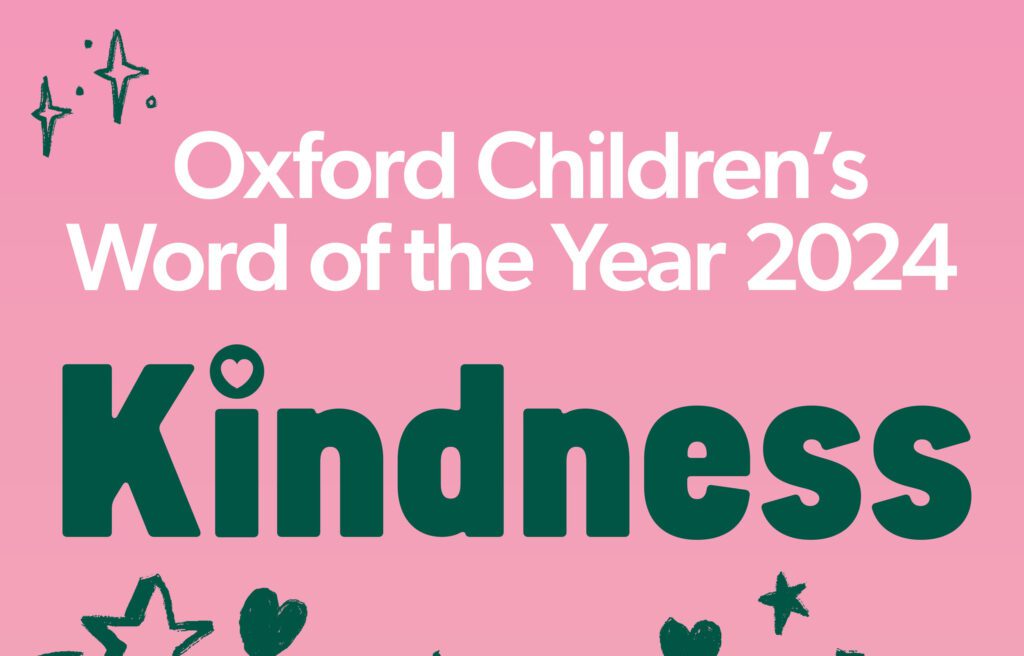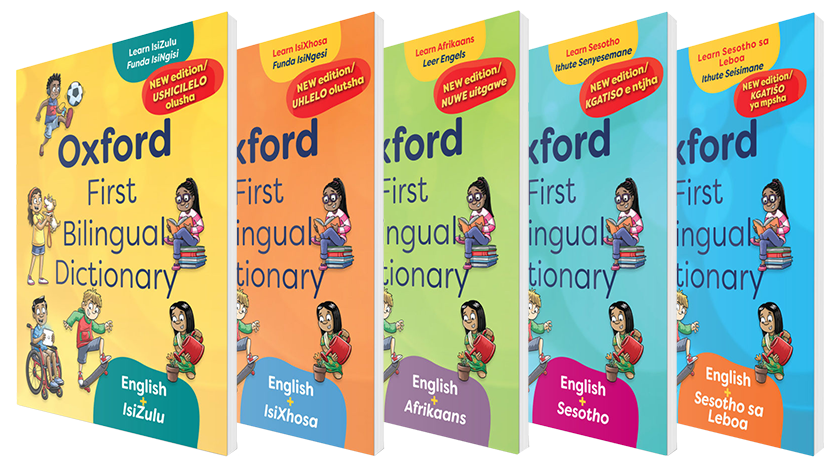Oxford University Press has selected ‘kindness’ as its Children’s Word of the Year for 2024. Chosen over contenders like ‘artificial intelligence’ and ‘conflict,’ over 6,000 children (ages 6 to 14) in the UK took part in the research, emphasising the importance of empathy, generosity, and positive actions. In the slang word category, ‘slay’ took the top spot, beating ‘sigma’ and ‘skibidi.’

The majority of respondents—61%—chose ‘kindness’ as their favourite word. Teachers participating in the research noted an increased awareness among children of how acts of kindness contribute to mental health, particularly in challenging times.
The survey also revealed that children’s focus on kindness is often influenced by their exposure to global events and their personal environments. Many young people cited the role of kindness in addressing the visible and hidden struggles others face. This suggests a generation that is deeply empathetic and attuned to the needs of others, even in a fast-changing and sometimes unpredictable world.
Linda Roos, Dictionary Publisher at Oxford University Press South Africa, said: “This study has been a useful entry point for understanding the importance of humanity among such young minds. As adults, we should never underestimate children’s ability to think deeply, their yearning for peace, and their relentless hope for positive change. Where communities treasure mutual support, kindness becomes a bridge towards unity and meaningful connections.”
Another study of the Oxford Children’s Corpus, the world’s largest database of writing by and for children in the English language containing over half a billion words, reveals AI remains a keen topic of interest for children who express varying viewpoints on the subject. In the search for the Oxford Children’s Word of the Year 2024, this sentiment is aptly demonstrated by children’s enthusiasm for embracing AI, with ‘artificial intelligence’ being voted runner-up by 25 per cent. Whilst children expressed concerns around fake online content and superintelligence, of those who selected ‘artificial intelligence,’ 53 per cent gave positive responses, such as ‘excited’ and ‘optimistic’.
While digital and social media tools offer incredible opportunities for learning and connection, they also expose children to new challenges such as cyberbullying and misinformation. In this context, kindness becomes even more important as a counterbalance to negativity, a tool for building healthy relationships and to navigate pressing issues like climate change and inequality.
“While AI presents exciting opportunities for education, healthcare, and economic growth, it also raises important questions about access and equity. By nurturing kindness alongside technological curiosity, we can help children approach these challenges with heart and intellect,” adds Roos.
“As parents, educators, and community leaders, it is our responsibility to model and encourage kindness. Small actions can make a significant difference, whether it’s creating safe spaces for children to express themselves, celebrating acts of kindness in schools, or integrating social-emotional learning into the curriculum.
As a dictionary publisher, we consistently work toward empowering young learners to recognise the value of kindness and equip them with the language they need to express it.”
For over a decade, the Oxford Children’s Word of the Year has provided valuable insights into the evolving language and values of young people. This year’s choice of ‘kindness’ is a testament to the optimism and empathy that define this generation.
For more on Oxford Children’s Word of the Year and to explore educational resources, visit Oxford University Press South Africa’s website.
Methodology
Over 3,000 children aged 6-14 years across the UK were asked for their suggested word of 2024 via our Educational Research Forum. Based on the most common responses and themes in their answers, three words – kindness, artificial intelligence and conflict – were shortlisted. A further 1,200 children were asked for their favourite slang word of 2024 via a CHILDWISE survey. The three words, along with the three shortlisted slang words, were then put to vote by a further 2,000 children via market research agency Opinium to decide their overall word of 2024.
About the Oxford Children’s Corpus
For over a decade OUP children’s lexicographers, publishers and editors have teamed up with academic researchers and experts in children’s language acquisition at the University of Oxford, and other research groups, to track changes in children’s vocabulary and self-expression. The database of language developed by OUP to enable this research is the Oxford Children’s Corpus; Oxford’s unique electronic database of writing for and by children and the largest children’s English language corpus in the world. Oxford Children’s Corpus enables OUP’s in-depth, authoritative linguistic analysis of children’s reading and writing.
Previous Oxford Children’s Word of the Year
The Children’s Word of the Year has reflected the influence and impact of media news stories and important topics of conversation in the grown-up world on young minds and imaginations:
2023 Climate Change
2022 Queen
2021 Anxiety
2020 Coronavirus
2019 Brexit
2018 Plastic
2017 Trump
2016 Refugee
2015 #hashtag
2014 Minion
About Oxford University Press
Oxford University Press (OUP) is a department of the University of Oxford. It furthers the University’s objective of excellence in research, scholarship, and education by publishing worldwide. OUP is the world’s largest university press with the widest global presence.
It publishes thousands of new publications a year, has offices in around fifty countries, and employs approximately 5,000 people worldwide.
It has become familiar to millions through a diverse publishing program that includes scholarly works in all academic disciplines, bibles, music, school and college textbooks, children’s books, materials for teaching English as a foreign language, business books, dictionaries and reference books, and academic journals.
About Oxford Children’s
Oxford Children’s, part of Oxford University Press, creates award-winning educational resources, picture books, fiction and dictionaries for schools and home. From the bestselling Oxford School Dictionary to classics such as Tom’s Midnight Garden as well as beloved children’s series Isadora Moon – not to mention home to Oxford Owl, a free educational platform created by leading experts – Oxford Children’s offers a range of outstanding books and resources for children at any stage of their learning journey.
Selection of quotes from children who took part in Oxford Children’s Word of the Year
Kindness
- It’s always important to be kind as a lot of people struggle with their mental health.
- Everyone you meet is fighting a battle we know nothing about. We should treat everyone with kindness. You never truly know how much it could help someone.
- Because it’s important to be kind as you don’t know who is suffering.
Artificial intelligence
- I would feel proud of what the technology has come to, but I’m also scared of it changing the future.
- It’s new and exciting and sounds like the future.
- Because I think that the world is a better place with ai as long as they do not take over our lives.
Conflict
- Many children like [me] have experienced conflicts in our personal lives, in our families, friendships.
- It seems like most of the world is in conflict – with other countries, people with other people…and so on
- Because there have been a lot of wars and fighting this year.
Slay
- When my friend showed me her new outfit, I said, You totally slay in that dress! Its my go-to word when I want to hype someone up and make them feel amazing.
- When a friend has done something really well I will say they have slayed it.
- We use it when something good happens most likely when someone else does something good or something we like.
Sigma
- We use it in a playful way to praise someone for being independent or making bold choices.
- When something or someone is cool.
- When I’m questioning something I say ‘what the sigma’ / When I’m in disbelief… what the sigma?
Skibidi
- It’s a random and silly word that instantly lightens the mood in our group.
- When I’m with friends, if were really hyped about something or just feeling silly, someone might say, Skibidi! and well all start doing the Skibidi dance moves, just for laughs. Or, if someone asks, Hows the vibe tonight? I might say, Oh, its totally Skibidi mode! to mean that were in a high-energy, fun mood.
- When something goes wrong I say what the skibidi.
Slang words definitions
- Slay means greatly impress or amuse someone, or be extremely impressive, stylish or successful
- Sigma means good or cool and can be used to describe males who are regarded as cool and admirable, especially in an independent and individualistic way.
- Skibidi this word does not have a specific meaning and can be used to mean cool or bad.
About Oxford Word of the Year
In December 2024, OUP announced ‘brain rot’ as Oxford Word of the Year 2024. For two decades, Oxford Word of the Year has highlighted the language that has shaped conversations and reflected the cultural shifts, patterns, and sentiments of a particular year. A word or expression that captures a defining theme from the past twelve months, candidates for Oxford Word of the Year are selected by OUP’s language experts via its 26-billion-word corpus of global language data. ‘Brain rot’ gained new prominence in 2024 as a term used to capture concerns about the impact of consuming excessive amounts of low-quality online content, especially on social media.



